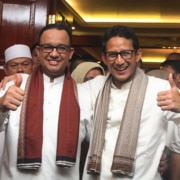
Women participating in the 2018 Women’s March in Jakarta. Photo by Bay Ismoyo.
International Women’s Day was celebrated on 8 March. It aims to commemorate the cultural, political, and socioeconomic achievements of women and bring attention to issues such as gender equality, reproductive rights, and violence against women. Since the fall of Soeharto, the Indonesian women’s movement has been instrumental in pushing for affirmative action policies that have promoted women’s participation in politics, and has successfully advocated for policies to protect the rights of women, such as the 2004 Law on Domestic Violence. At the same time, however, major challenges remain, particularly in maternal health, violence against women and discrimination. In Indonesia, as elsewhere, women are raising their voices and calling for improvements to women’s safety and equality.
What has been achieved in terms of women’s rights and equality in the post-authoritarian era in Indonesia? Are more women entering politics and what impact are they having? What are the issues driving the women’s movement today?
In Talking Indonesia this week, Dr Jemma Purdey speaks to Dr Kurniawati Hastuti Dewi a senior researcher at the Indonesian Institute of Sciences (LIPI), about Indonesia’s women’s movement and its role in bringing about social and political change.
In 2021, the Talking Indonesia podcast is co-hosted by Dr Jemma Purdey from the Australia-Indonesia Centre, Dr Dave McRae from the University of Melbourne’s Asia Institute, Dr Annisa Beta from the University of Melbourne’s School of Culture and Communication, and Dr Charlotte Setijadi from Singapore Management University.
Look out for a new Talking Indonesia podcast every fortnight. Catch up on previous episodes here, subscribe via Apple Podcasts or listen via your favourite podcasting app.
Kurniawati Hastuti Dewi is a senior researcher at the Center for Political Studies, Indonesian Institute of Sciences (LIPI). Her research interests are in the areas of gender and politics, women and politics, gender and decentralisation. She received her MA in Asian Studies from the Australian National University (2007) and PhD from the Graduate School of Asian and African Area Studies (ASAFAS) Kyoto University Japan (2012). Her doctoral dissertation was published as a book, Indonesian Women and Local Politics: Islam, Gender and Networks in Post-Suharto Indonesia (Singapore: National University of Singapore Press & Kyoto University Press, 2015). Her latest research explores the use of motherhood identity in the 2019 Indonesian presidential election, and was published as ‘Motherhood Identity in the 2019 Indonesian Presidential Elections: Populism and Political Division in the National Women’s Movement’, Contemporary Southeast Asia vol. 42, no. 2 (2020): 224-250. She is Secretary General of Asian Association of Women’s Studies (AAWS, 2020-2022).











